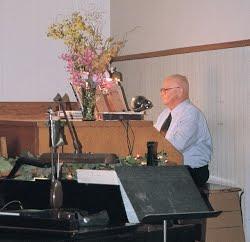- |
User Links
Verne Munro Eke

| Short Name: | Verne Munro Eke |
| Full Name: | Eke, Verne Munro |
| Birth Year: | 1934 |
| Death Year: | 2012 |
South Sound arts visionary Eke putting on shows for a higher power now
July 15, 2012
Verne Munro Eke died this week.
The name might not strike a chord with those who arrived in Olympia within the past two decades. But Eke was a dramatic and major player in the Olympia performing arts community for more than 40 years.
Even if you don’t recognize the name, the artistic legacies he left behind are well known: Harlequin Productions. The Washington Center for the Performing Arts. The Capital Area Association for the Performing Arts.
Those who knew Eke, remember him as a brilliant musician and singer, talented orchestra leader, music scholar, and tireless promoter of a performing arts center in the capital city.
Eke was born and raised in Tumwater about 77 years ago. His parents owned the Olympia Monument Works on the current site of Pellegrino’s Italian Kitchen.
He grew up in a politically savvy family. His father was a long-time Tumwater city councilman and eventually the mayor. His mother was a Tumwater postmaster in a small post office building next to the city’s fire station and eagerly encouraged her son in the arts.
Eke sang and played saxophone and piano in high school, taking part in school plays and earning entry into the National Honor Society. He graduated from Olympia High School in 1952 and would later earn a doctorate from the University of California, Los Angeles, specializing in historical and systematic musicology.
It is one of the Eke legends that he began his stage career as a teenager producing performances in the backyards of his west side friends.
After some time as an instructor and administrator at UCLA, Eke returned to Olympia in the early 1970s and, with Jim This, turned his attention to producing and conducting operas and musicals in the Abbey Theatre at Saint Martin’s College, and later at the Capital High School auditorium.
Eke and This co-founded the original Harlequin Productions. Together they produced a dozen shows, including “Carousel,” “Oklahoma,” “Hello Dolly,” “The King and I,” “West Side Story,” “Fiddler on the Roof,” “The Sound of Music” among others.
Eke was the music director, and handled publicity, tickets and other administrative chores. As the stage director, This took responsibility for the design and construction of the sets. Eke and This productions became the talk of the town, and quickly know as the center of artistic activity in Olympia.
This remembers, “His orchestras at our operas and musicals were incredible. They were full – 20 to 30 musicians – something you do not normally see at the community level.”
Like other famous artistic collaborations, This says, “We used to have good natured arguments over the volume of the orchestra – in an era before the on-stage performers were all miked”
It became apparent to Eke that Olympia needed a top-quality performing arts center, and he began a crusade to build one that would consume the reminder of his time in the South Sound.
He founded CAAPA, the group that got the ball rolling, even while he and This were heading up summer festivals of performing arts in the Jade Room, upstairs in the old Hotel Olympian. Dancers, choral performers, piano and other instrumental soloists were featured every summer.
He traveled to Washington, D.C., in 1976 to promote a CAAPA grant application at the National Endowment for the Arts. They wanted more information, and Eke wrote back to friend, Sally Anacker, who starred in some of his productions, “They gave me a typewriter and a phone in a beautiful room overlooking the Watergate Hotel!!” Within a few weeks, the NEA awarded the grant.
Eke spent countless hours speaking at city and county meetings on behalf of building a performing arts center here, and presenting the idea at civic and charitable organizations.
His lobbying leadership eventually struck gold. He won a $1.5 million grant from the state, which the City of Olympia matched and used to build The Washington Center. And he effectively lobbied for the 1979 amendment that allowed a portion of the city’s hotel-motel tax to be given to arts venues, rather than only sports facilities. That tax helps support The Washington Center today.
After a sad bout with alcoholism, Eke got himself right again and moved to Seattle where he took a position as music director for the Fremont Baptist Church.
On Monday, Eke lost a fight with cancer and died in Swedish Hospital.
He will be remembered by those in the South Sound who shared his passion for the performing arts, like This, who called him one of the finest musicians he will ever know, a man truly dedicated to the arts and capable of bringing out the best of the performers he directed.
“He was extremely generous, with his time, his money and his art. He encouraged many people and got the best out of all of them,” This said.
Break a leg, Verne.
Olympian publisher and editorial page editor George Le Masurier is also chair of the board of directors for The Washington Center for the Performing Arts.
| Tunes by Verne Munro Eke (1) | As | Instances | Incipit |
|---|---|---|---|
| BATALAS DU REĜOJ | Verne Munro Eke (Harmonizer) | 1 |


 My Starred Hymns
My Starred Hymns

